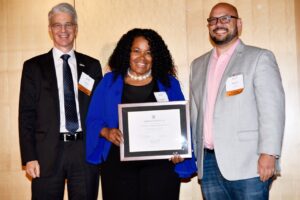It is estimated that of all the property taxes we pay each year, well over half of those dollars goes to the school system. Most of us say that’s just fine, except it keeps going up nearly 10% a year.
 |
|
Sandy Galef |
Until recently, all that has been done about it is a long string of editorials in our various newspapers and an occasional conversation in Albany that has gone basically nowhere. Even the Pataki “STAR” system is coming under increasing criticism saying that the tax break received is quietly made up for in other forms of revenue collection.
In a River Journal interview with Sandy Galef, New York State Assembly Member from the 90th District (the Western half of Putnam County and the Hudson side of Northern Westchester), Galef indicated that she could be the first to not only do something but is willing to take on the basic challenges in fixing the system. Sandy is a former school teacher and former Westchester County legislator, and is now in her 8th term in the State Assembly. One year ago, Sandy was named Chairperson of the State Real Property Taxation Committee in the Assembly, and is now examining what appears to many laymen as long term apathy toward a property tax structure that is increasingly hurting just about everybody. What’s more, NY State and Westchester County are ranked near the top of property taxpayers and it doesn’t look like it’s going to stop anytime soon.
Galef is currently looking at tax problems in a way that NY State politicians probably did not anticipate, i.e., she has immediately focused on the base problem of the system, which is the continuous conflict of various political and commercial real estate interests that are too often at cross purposes with one another, making clear solutions by our legislators nearly impossible. Nowhere, for example, is the problem more clearly illustrated than the taxation of NY’s condominiums versus that of similarly sized and valued “stand-alone” homes. Currently, condominiums are taxed as commercial property with a tax base nearly half that of the residential “stand-alone” home, often located in the same neighborhood. When it comes to making the obvious adjustment, local politicians, depending on the location and circumstance, are not about to vote against a real estate law that helps their constituencies, nor will they vote for a law that adversely hurts local voter interests. To that point, in far too many cases, our politicians have simply gone silent when tax issues arise. Lawmakers have even allowed this conflict to go unattended because condominiums have also represented, in many cases, “affordable housing” with a condominium’s lower buying price along with the obvious abatement in property tax levels.
The list of time-worn conflicts does not stop there. Because of current appreciation differences in commercial property values versus residential, village tax collectors are now being sued successfully by condominium and business owners for excessive tax evaluations and are receiving large rebates or “certioraris” as they are known as in the real estate industry. The net for the school system is a doubling effect, i.e., the school system not only loses already collected tax revenues, but those properties are forever off the roles as annual high tax producers, and next year’s property tax is once again higher than last year’s.
Even if the valuation system is brought up to date, the net can still be that a large portion of the community no longer has sufficient income to pay their rising property taxes. They are too often being forced to sell their homes and move elsewhere, quite often away from older children and friends. A number of politicians have asked for an income tax rather than a property tax in this situation, but certain elements of the construction industry will not go along easily with this suggestion. Others are thinking about a special “reverse” mortgage plan that specifically addresses long-range property taxes.
When it comes to rentals, many villages are not getting full revenue from their renters since the property owner is responsible for the tax bill. The result is that the apartment renter does not contribute at the level of a homeowner. Some experts estimate that a renter is the equivalent of 1/2 of a single family homeowner.
In a very real sense, the current property tax situation is as close to a “Gordian Knot” as you are going to get. Galef hopes to appoint a Blue Ribbon Panel to develop suggestions. She is emphatic that overriding all applicable “special interests” will take at least a County-wide set of rules to provide the necessary clout to make changes. She is also pleased with the parallel interests of Howard Smith, Sleepy Hollow’s Superintendent of Schools, who has held at least one major meeting on the subject with other school officials from neighboring school systems. Smith also feels that a large body of influence like the State school system is absolutely key for working through the problems. He also feels that the individual citizen is not organized enough to put sufficient pressure on individual districts and their representatives in order to begin the necessary corrections. It should also be noted that our new Governor, Eliot Spitzer, has made it clear that he also wants to improve the situation.
Whatever happens, it will take the initiative of Galef and Smith to pull it off. Both are absolutely correct that it will take the force of many school districts to make changes. The difference is that we now have the promise that somebody is, indeed, starting to do something about it!






